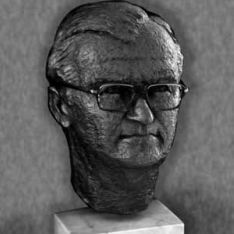
Biography
John Richmond was a distinguished physician who held several high offices in medicine: Professor and Dean of the medical school at the University of Sheffield, Senior Censor and Vice-President at the Royal College of Physicians of London and, between 1988–91, President of the Royal College of Physicians of Edinburgh.
The son of a Scottish mining engineer he was educated at Doncaster Grammar School, excelling both academically and on the sports field. He elected to study medicine in Edinburgh, rejecting a place at St John’s College, Cambridge. It was the right choice as the Royal Infirmary had some outstanding clinical teachers in Derrick Dunlop, Stanley Davidson, James Learmonth, David Henderson and Rae Gilchrist, who made a lasting impression on the young Richmond.
He gained a ‘blue’ in diving as an undergraduate and qualified with distinction in July 1948, one week after the inception of the National Health Service. After a period as a resident house officer at the Deaconess Hospital, later to become the Headquarters of Lothian Health, he was called up and spent the greatest part of his National Service as Medical Officer to the 1st Nyasaland Battalion of the King’s African Rifles based in Lusaka, Northern Rhodesia. It was there that he met his wife, Jenny Nicol.
After demobilisation there followed an unexpected spell in general practice in Dumfriesshire as a result of an uncle’s illness, and a few months as a senior house officer in medicine in Kettering before returning to the Royal Infirmary in 1953 where he was soon taken under the wing of Professor (later Sir) Stanley Davidson. He was encouraged to develop an interest in haematology and oncology and spent a year as a Fulbright Scholar in New York at the Memorial Sloan Kettering Cancer Center, becoming a Senior Lecturer in Medicine and Honorary Consultant Physician in 1963.
When accepting the Chair in Sheffield in 1973, John Richmond was one of the last of the professors of medicine appointed on the basis of all-round excellence in clinical practice, teaching, research and administration rather than because of any potential to attract large research grants. His own research, principally in the field of disorders of the spleen, was very significant. When in Sheffield he became interested in postgraduate medical education and examinations at the Royal College of Physicians of London and became Chairman of the Examining Board for the MRCP(UK). He was unique in having held such high offices in a sister college when he was elected as President of the Royal College of Physicians of Edinburgh in 1988.
About half of the Fellows of the Edinburgh College live and work overseas, mainly in the British Commonwealth, and John Richmond and his wife were outstanding ambassadors. He never ceased to be impressed by the global influence of Scottish medicine with its emphasis on a good history and clinical examination in reaching a diagnosis. It gave him no pleasure to have foreseen the problems in training for young doctors before the European Working Time Directive was implemented. He was appointed CBE for services to Medicine in 1993.
Notable Achievements
Richmond was president of the Royal College of Physicians of Edinburgh between 1988 and 1991
He was appointed CBE for services to Medicine in 1993
Previously published in the Journal of the Royal College of Physicians of Edinburgh (2012), 42: 91
Author: Tony Toft.



